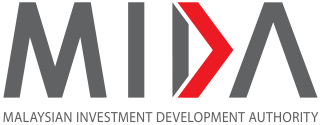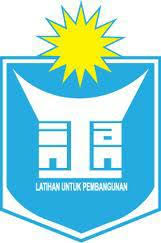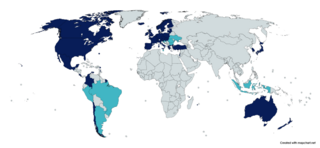The economy of Gibraltar consists largely of the services sector. While part of the European Union until Brexit, the British overseas territory of Gibraltar has a separate legal jurisdiction from the United Kingdom and a different tax system. The role of the UK Ministry of Defence, which at one time was Gibraltar's main source of income, has declined, with today's economy mainly based on shipping, tourism, financial services, and the Internet.

The Hellenic Statistical Authority, known by its acronym ELSTAT, is the national statistical service of Greece.

Kedah, also known by its honorific Darul Aman and historically as Queda, is a state of Malaysia, located in the northwestern part of Peninsular Malaysia. The state covers a total area of over 9,000 km2, and it consists of the mainland and the Langkawi islands. The mainland has a relatively flat terrain, which is used to grow rice, while Langkawi is an archipelago, most of which are uninhabited islands.

The International Development Research Centre is a Canadian federal Crown corporation. As part of Canada's foreign affairs and development efforts, IDRC champions and funds research and innovation within and alongside developing regions to drive global change. IDRC invests in high-quality research in developing countries, shares knowledge with researchers and policymakers for greater uptake and use, and mobilizes global alliances to build a more sustainable and inclusive world.
City region is a term in use since about 1950 by urbanists, economists and urban planners to mean a metropolitan area and hinterland, often having a shared administration. Typically, it denotes a city, conurbation or urban zone with multiple administrative districts, but sharing resources like a central business district, labour market and transport network such that it functions as a single economic unit
Danish International Development Agency (DANIDA) is the brand used by the Ministry of Foreign Affairs of Denmark when it provides humanitarian aid and development assistance to other countries, with focus on developing countries. There is no distinct Danida organisation within the Ministry.

The Malaysian Investment Development Authority, abbreviated MIDA, previously known as Malaysian Industrial Development Authority is the government's principal agency to oversee and drive investment into the manufacturing and services sectors in Malaysia. Starting operations in 1967, MIDA was given the mandate to promote investments in the manufacturing and services sectors; and to advise the Ministry of International Trade and Industry (MITI) on industry matters including the formulation of related policies.
The Congress of Union of Employees in the Public and Civil Services Malaysia, abbreviated CUEPACS, is a national trade union centre in Malaysia. It has a membership of 1,200,000.
East Coast Economic Region(ECER) (Malay: Wilayah Ekonomi Pantai Timur; Jawi: ولايه ايكونومي ڤنتاي تيمور) is an economic development region based on the east coast of Peninsular Malaysia, which covers the states of Kelantan, Terengganu, and Pahang, and the Johorean districts of Mersing and Segamat. ECER is also one of the three economic corridors launched in Peninsular Malaysia under the leadership of Prime Minister Abdullah Ahmad Badawi, the fifth Prime Minister of Malaysia. The other corridors are Iskandar Malaysia in Johor and the Northern Corridor Economic Region (NCER) that covers the states of Penang, Kedah, Perlis and Northern Perak. The ECER development program spans 12 years, beginning in 2007, and involves Public-Private Participation (PPP).

Peninsular Malaysia, historically known as Malaya, also known as West Malaysia or the "Malaysian Peninsula", is the western part of Malaysia that comprises the southern part of the Malay Peninsula on Mainland Southeast Asia and the nearby islands. Its area totals approximately 132,490 km2 (51,150 sq mi), which is nearly 40% of the total area of the country; the other 60% is in East Malaysia on the island of Borneo.

The International Transport Forum (ITF) is an inter-governmental organisation within the OECD system. It is the only global body with a mandate for all modes of transport. It acts as a think tank for transport policy issues and organises the annual global summit of transport ministers. The ITF's motto is "Global dialogue for better transport". Between 1953 and 2007, the organisation had existed for over fifty years as the European Conference of Ministers of Transport. The organisation is responsible for creating several standards, including the Classification of European Inland Waterways.

The National Institute of Public Administration or popularly known as INTAN is a Malaysian government agency responsible for the training of civil servants in management and administration.

The Ministry of Health is a ministry of the Government of Malaysia that is responsible for health system: health behaviour, cancer, public health, health management, medical research, health systems research, respiratory medicine, health promotion, healthcare tourism, medical device, blood collection, leprosy control, clinical research, health care, dental care, health institution, laboratory, pharmaceutical, patient safety.

The Prime Minister's Department is a federal government ministry in Malaysia. Its objective is "determining the services of all divisions are implemented according to policy, legislation / regulations and current guidelines". It is headed by the Prime Minister of Malaysia followed by other Minister in the Prime Minister's Department. The Department consists of the Prime Minister's Office, the Deputy Prime Minister's Office and more than 50 other government agencies and entities. The Prime Minister's Department was established on July 1957. Its headquarters are in Perdana Putra, Putrajaya.

The Organisation for Economic Co-operation and Development is an intergovernmental organisation with 38 member countries, founded in 1961 to stimulate economic progress and world trade. It is a forum whose member countries describe themselves as committed to democracy and the market economy, providing a platform to compare policy experiences, seek answers to common problems, identify good practices, and coordinate domestic and international policies of its members.

The Ministry of Rural and Regional Development is a ministry of the Government of Malaysia that is responsible for rural development, regional development, community development, Bumiputera, Orang Asli, rubber industry smallholders, land consolidation, land rehabilitation.

Bintulu Development Authority (BDA) is a local council which administers Bintulu town and other areas of Bintulu Division. The agency is under the purview of Sarawak Ministry of Local Government and Community Development.

The Ministry of Agriculture and Food Security, abbreviated MAFS, is a ministry of the Government of Malaysia that is responsible for agriculture, agro-based industry, agritourism, livestock, veterinary services, fisheries, quarantine, inspection, agricultural research, agricultural development, agricultural marketing, pineapple industry, agribusiness, botanical garden, food security, food sovereignty.










